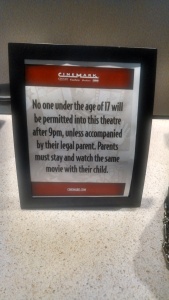It is 10 p.m. on a Thursday night. The Senator movie theater on York Road, stands regally—a reminder of another time. All is quiet on the street, a stark contrast to the new theater a few miles away in Towson where kids have lined up hours in advance to be the first to see the newest Hunger Games flick.
When the movie lets out after midnight, a lone police cruiser sits at the corner, lights flashing during a traffic stop. The officer, never nears the theater to investigate if youth are in the crowd of moviegoers and Katniss Everdeen fanatics.
The Senator, a theater boasting 900 seats and $9 tickets, saw a sprinkling of activity during what should have been a busy night. Most of its patrons at its 10 o’clock showing of The Hunger Games: Mockingjay Part 1—the No. 1 movie in America its opening weekend —were adults or college students from neighboring Towson University who came for the Senator’s historic Art Deco architecture.
Baltimore City’s new curfew, one of the strictest in the nation, may threaten more than the social life of teens; it may actually be bad for businesses, as well.
The curfew mandates that children under 14 be home by 9 p.m. and that teens 14 to 16-years old be in before 10 p.m. on weeknights and by 11 p.m. on weekends and during the summers.
On Friday and Saturday nights, youth who are picked up are taken to one of two Youth Connection Centers, the Lillian Jones recreation center in Sandtown-Winchester or the Collington Square recreation center in Broadway-East. Youth are picked up and taken home by a curfew officer (or to Child Protective Services if they’re under 12) during the rest of the week when the centers are closed.
While the curfew does allow older teens to be out if they are returning from work or are coming home from a church or recreation event, it could still spell trouble for many teens and businesses that employ and service them.
For example, Harbor East movie theater, located in downtown Baltimore, doesn’t get a lot of teen business after 9 p.m. because of the curfew.
“A lot of kids don’t hang out here at night anymore,” says Destiny Bonds, a cashier at the theater. “The police don’t really stop anyone down here, but I guess they’re being on the safe side.”
On a Friday night at Harbor East, “Dolphin Tale 2,” a PG-rated Disney movie was playing at 9:25 p.m. despite targeting children under the age of the curfew.
City Council member Brandon Scott says the curfew’s not to blame for teen attendance at Harbor East. I will tell you that that movie theater historically and typically doesn’t have kids,” says Scott, who pushed through the new law that updated Baltimore’s 20-year-old curfew. “Especially with the one open in Towson recently, that’s where all the kids go.”
Cinemark in Towson has extended the curfew to its theater, perhaps to discourage youth from breaking the curfew in place just down the street in Baltimore City. On its website and at the ticket kiosks, there is a warning that no one under the age of 17 will be admitted into the theater after 9 p.m. without an adult. The Towson Mall also suffers from the curfew. Although the mall is located in Baltimore County, many of its patrons live in the city.
“I’m not concerned about the county,” says Scott, whose title only provides him jurisdiction in Baltimore City. “But, I will tell you that the county has curfew in certain places so kids can’t be in White Marsh [mall] alone after a certain time. I’m assuming with what they’ve done at Towson, that Towson’s going to soon follow that.”
Baltimore City has also instituted a daytime curfew bans students from entering businesses such as fast food restaurants and convenience stores from 7:30 a.m. to 3 p.m.
Tanya Williams, a curfew center facilitator says that police offer incentives to businesses such as promising to order meals for school events to encourage them to abide by the daytime curfew. Some school administrations even have relationships with neighboring businesses and will get a call from owners and managers when students show up to their businesses.
Some parents and teens still don’t understand the curfew restrictions and its intentions. Many teens have reported being stopped by the police for other reasons, few have said that they’ve been stopped for curfew violations, a fact that worries many of the people who don’t support the curfew.
“Anytime you have police picking up young people it’s going to raise suspicion of the community,” says William.
